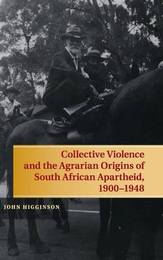
|
Collective Violence and the Agrarian Origins of South African Apartheid, 1900-1948
Hardback
Main Details
| Title |
Collective Violence and the Agrarian Origins of South African Apartheid, 1900-1948
|
| Authors and Contributors |
By (author) John Higginson
|
| Physical Properties |
| Format:Hardback | | Pages:410 | | Dimensions(mm): Height 229,Width 152 |
|
| Category/Genre | African history |
|---|
| ISBN/Barcode |
9781107046481
|
| Classifications | Dewey:968.05 |
|---|
| Audience | | Professional & Vocational | |
|---|
| Illustrations |
3 Maps; 12 Halftones, unspecified; 12 Halftones, black and white; 5 Line drawings, black and white
|
|
Publishing Details |
| Publisher |
Cambridge University Press
|
| Imprint |
Cambridge University Press
|
| Publication Date |
24 November 2014 |
| Publication Country |
United Kingdom
|
Description
This book examines the dark odyssey of official and private collective violence against the rural African population and Africans in general during the two generations before apartheid became the primary justification for the existence of the South African state. John Higginson discusses how Africans fought back against the entire spectrum of violence ranged against them, demonstrating just how contingent apartheid was on the struggle to hijack the future of the African majority.
Author Biography
John Higginson is Professor of History at the University of Massachusetts, Amherst. He is also a research Fellow in the College of Human Sciences and the department of history at the University of South Africa in Pretoria, South Africa. He is the author of A Working Class in the Making: Belgian Colonial Labor Policy, Private Enterprise and the African Mineworker, 1907-1951 (1989). He has written numerous articles and book chapters on South Africa and the regional economic system of southern Africa.
Reviews'From the epochal devastation of the South African War to the tyrannies of neo-fascists, Collective Violence and the Agrarian Origins of South African Apartheid, 1900-1948 explores the role of violence in the making of white supremacy. Higginson guides us through the transformation of South Africa's rural worlds, the anxieties and turmoil that consumed people's lives, and the violence that has profoundly shaped the country's history. Richly researched and closely argued, this timely book is an important reminder of a not-too-distant past, and of the troubling violence in South Africa today.' Clifton Crais, Emory University, Atlanta 'John Higginson has given us a fast-paced and engaging history of the way in which agrarian policy, poverty, war, gender, and age play intersecting roles in the creation and spread of violence. Carefully researched and thoughtfully argued, the text brings us into the inner lives of politicians, poor whites, African smallholders, and British imperialists, showing how and why they came to see violence as the most effective way to solve a range of tactical political problems. Higginson sheds new light on the roots of political violence in South Africa, and his work is a must-read for policy makers, scholars, and activists who want to understand the roots of violence in the past in order to find ways to prevent it in the future.' Zine Magubane, Boston College 'How are nations carved from empires, and then made and remade? This deeper question drives John Higginson's magisterial account of the South African experience from the imperial war of 1899-1902 to the rise of apartheid in 1948. Recondite of research, adroit of argument, tantalizing of telling, and passionate of spirit - for his is not a dispassionate subject - Higginson's book is indispensable for appreciating Mandela's South Africa. A monument to South African and African historical studies.' Michael West, State University of New York, Binghamton 'The argument of this deeply researched and attractively written book is that rural power and violence is central to the understanding of modern South African history and, further, that these dynamics underlie the evolution of the system of racial segregation into full-scale apartheid ... Higginson ends by speculating that South Africa's long history of collective violence, past and present, leaves deep scars and he ventures that it is entirely possible that the future will continue to be turbulent. It is a sober conclusion, and not one that is easy to discount.' The American Historical Review 'The book provides a fine-grained detail of how the countryside became an arena of struggle and violence between the Afrikaner farmers, the British occupiers, and African smallholders, for about five decades up to the official birth of apartheid in 1948. It demonstrates how official and extralegal collective violence were crucial in securing a boerestad (white homeland), while also transforming the countryside. The book also contributes a fresh and rich detail of African people's agency in dealing with both their threatened land-based livelihoods and the violence they were confronted with ... researchers on land reform, current service delivery protests in South Africa, peace research, as well as policy-makers, should find this book very useful. The preface and the introductory chapter of the book begin with the present and familiar, to set the scene for understanding and appreciating the detail that follows in subsequent chapters.' Thembela Kepe, Safundi: The Journal of South African and American Studies
|